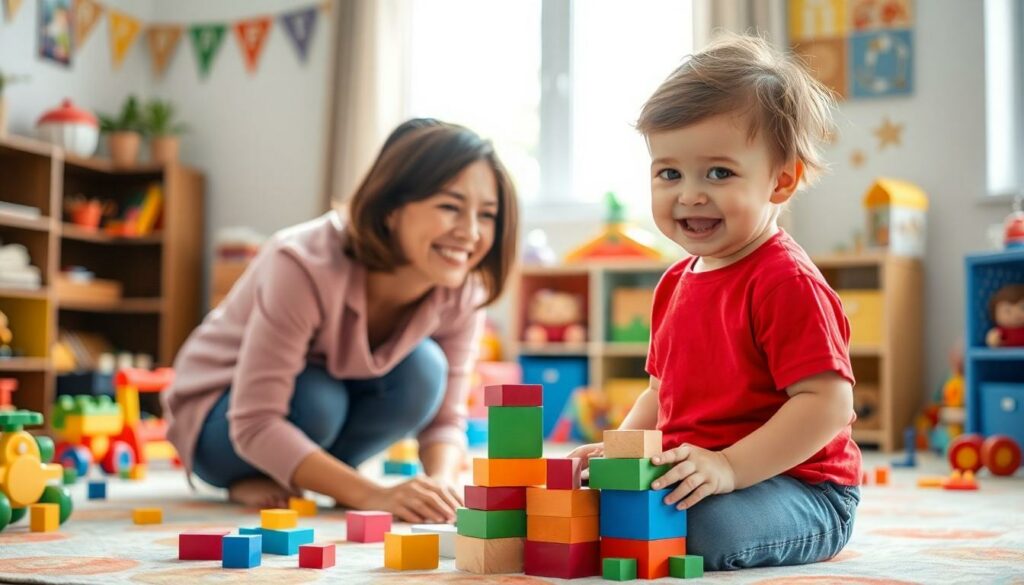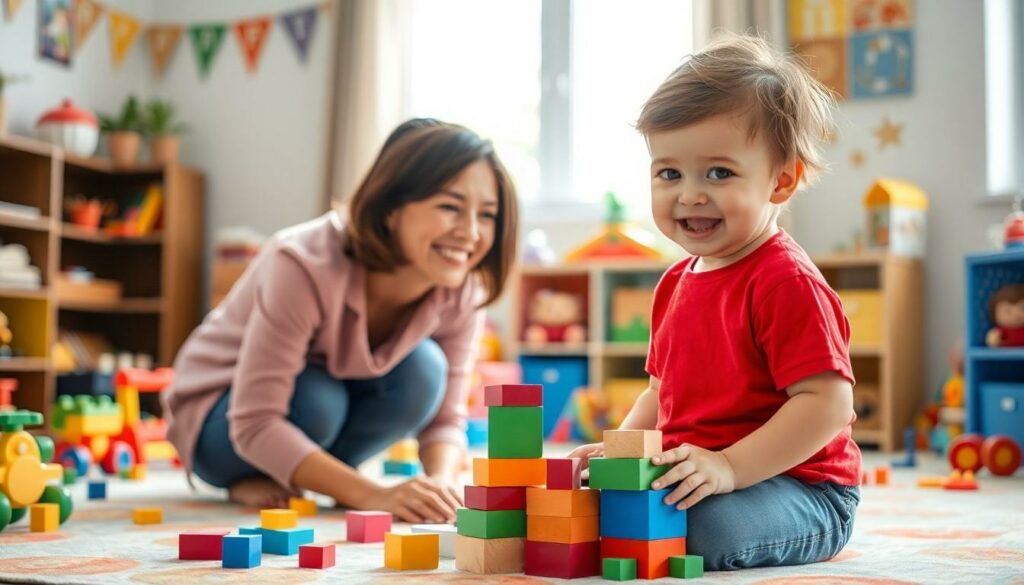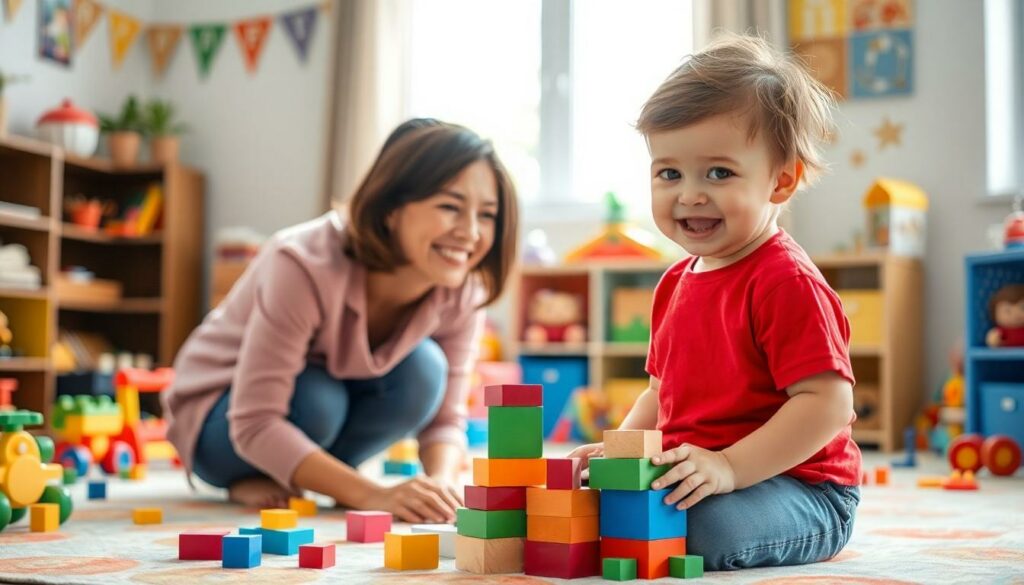Table of Contents
ToggleNavigating the wild world of preschoolers can feel like attempting to tame a tiny tornado. One moment they’re sweetly singing their ABCs, and the next, they’re staging a dramatic meltdown over a misplaced snack. Parents often find themselves wondering if they accidentally signed up for a reality show instead of a parenting journey.
Understanding Preschool Development
Understanding preschool development involves recognizing the rapid changes children experience during these formative years. Parents play a crucial role in supporting these changes.
Key Milestones in Preschoolers
Children achieve several key milestones between ages three and five. Physical development includes refining motor skills, such as jumping, running, and drawing. Cognitive growth appears through problem-solving skills and curiosity about their environment. Language development emerges as preschoolers expand their vocabulary, often using complex sentences. Social skills mature as they learn to cooperate with peers, share toys, and take turns. Each milestone represents an important step in their overall growth, guiding parents in nurturing their children’s development.
Emotional and Social Growth
Emotional growth is significant during the preschool years. Children learn to identify and express their feelings, an essential aspect of emotional intelligence. Social growth flourishes as they engage with other children, developing friendships and understanding social cues. They often mimic adult behaviors, exploring empathy and compassion through play. Parents can foster this growth by encouraging cooperative play and discussing emotions. Supporting friendships helps preschoolers build confidence, enhancing their ability to navigate social situations effectively. This growth lays the foundation for healthy relationships in the future.
Effective Communication Strategies
Effective communication fosters understanding between parents and preschoolers. Using specific strategies helps in addressing the challenges that arise during this developmental stage.
Active Listening Techniques
Active listening builds trust and strengthens connections. Parents should maintain eye contact during conversations, showing that they’re engaged. Acknowledging feelings, such as sadness or excitement, validates children’s emotions. Repeating or paraphrasing what the child says reinforces understanding. Asking open-ended questions encourages deeper conversations and critical thinking. Remaining patient allows preschoolers the time they need to express their thoughts without interruption.
Encouraging Expression
Encouraging expression empowers preschoolers to communicate freely. Parents can provide opportunities for children to share experiences through storytelling or art projects. Offering varied vocabulary helps expand their language skills, allowing them to articulate thoughts more clearly. Encouraging discussions about emotions nurtures emotional intelligence and self-awareness. Allowing time for reflection gives children the chance to think through their feelings and responses. Demonstrating effective expression through their own words models communication and promotes a healthy exchange of ideas.
Positive Discipline Approaches
Positive discipline focuses on teaching preschoolers appropriate behavior through gentle methods. Parents can utilize several techniques that promote learning and understanding.
Setting Boundaries
Setting clear boundaries is essential for preschoolers. They thrive with consistency, which helps them understand expectations. Parents can communicate rules directly and reinforce them with simple reminders. Visual aids, like charts or pictures, make boundaries easier for children to grasp. Praise for following rules encourages positive behavior, while a gentle review of expectations after missteps reinforces understanding. Establishing routines also provides a framework that allows preschoolers to navigate their daily lives confidently.
Time-Out Techniques
Time-out can serve as an effective discipline tool when used correctly. It acts as a moment for preschoolers to calm down and reflect on their behavior. Parents should announce the time-out calmly, explaining why it is necessary. Ideally, a designated time-out spot should be a safe, quiet space free from distractions. Duration is crucial; the time-out should last for one minute per year of age. After the time-out, parents can discuss what occurred, encouraging children to express their feelings and understand the consequences of their actions.
Fun and Educational Activities
Engaging preschoolers in fun activities boosts their development and learning. Parents can choose from a variety of options to keep their children entertained while encouraging growth.
Play-Based Learning
Play-based learning combines fun with educational value. It’s essential for fostering creativity and problem-solving skills in preschoolers. Incorporating games like building blocks or scavenger hunts promotes critical thinking. Children can explore their environment through imaginative play, enhancing social skills and emotional intelligence. They learn cooperation while sharing toys and taking turns. Encouraging group activities, such as team challenges, nurtures teamwork and communication. Play not only provides enjoyment but also lays a strong foundation for lifelong learning skills.
Creative Arts and Crafts
Creative arts and crafts offer endless opportunities for self-expression. Engaging in activities like painting, drawing, or crafting helps develop fine motor skills and hand-eye coordination. Using materials such as paper, glue, and crayons allows preschoolers to create unique projects. Parents can introduce themes, like animals or seasons, to inspire creativity and vocabulary expansion. Children learn to follow instructions while experimenting with colors and shapes. Art projects also provide a comfortable outlet for emotional expression, reinforcing confidence in their abilities and ideas.
Building a Healthy Routine
A healthy routine supports preschoolers’ development and brings stability to their daily lives. Consistency in activities promotes a sense of security, helping children thrive.
Establishing Consistent Schedules
Creating a daily schedule helps preschoolers know what to expect. Prioritizing consistent wake-up and bedtimes strengthens sleep patterns, which influence mood and behavior. Allocating specific times for meals, play, and learning sharpens their focus and willingness to participate. Parents can use visual schedules featuring pictures of activities, making it easier for young children to understand. Regular routines not only ease transitions but also encourage independence, as preschoolers learn to anticipate their responsibilities throughout the day.
Incorporating Healthy Habits
Embedding healthy habits into daily routines fosters lifelong wellness. Introducing balanced meals that include fruits and vegetables builds strong nutrition. Encouraging physical activity, such as outdoor play and structured games, promotes fitness and helps release energy. Teaching preschoolers about hygiene practices like hand washing and dental care contributes to their overall health. By involving them in these habits, parents can set the stage for healthy choices and reinforce positive behaviors, making them more likely to adopt these practices as they grow.
Navigating the world of preschool parenting can be both challenging and rewarding. By understanding the developmental milestones and employing effective communication strategies, parents can foster a nurturing environment for their children. Positive discipline techniques and engaging activities not only promote good behavior but also encourage creativity and emotional expression.
Establishing a healthy routine lays the groundwork for stability, helping preschoolers thrive. By incorporating these parenting tips, caregivers can build strong connections with their children and support their growth during these formative years. Embracing this journey with patience and love will ultimately lead to a fulfilling parenting experience.







